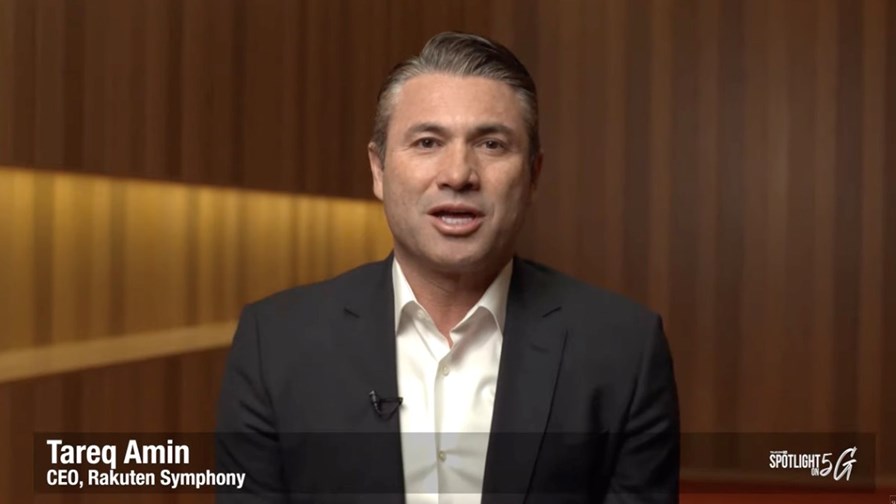
Tareq Amin, CEO, Rakuten Symphony, and CEO, Rakuten Mobile.
- Rakuten Symphony is desperate to get its foot in the door of North American operators
- It’s heading to the MWC Las Vegas trade show
- Tareq Amin, CEO of Rakuten Symphony and Rakuten Mobile, plans to make a splash
- He will unveil Symphony’s RAN intelligent controller platform and give it away for free
Tareq Amin is not one for sitting still. The CEO of disruptive Japanese operator Rakuten Mobile, and its cloud-enabled Open RAN technology spin-out Rakuten Symphony, is heading to the stage at the MWC Las Vegas event this week to tell as many network operators as possible that Symphony has completed the development of its RAN intelligent controller (RIC) platform and that he’s going to give it away for free.
Given that the RIC is regarded as the brains of a disaggregated mobile network architecture and, in essence, the operating system that will be the launchpad for network function and application innovation in Open RAN networks, throwing it over the fence for free sounds like a rather bold business move. But it’s one that fits in with Symphony’s mission to get as many network operators as possible to ‘try before you buy’ and get acquainted with the potential of Open RAN, which continues to face multiple acceptance challenges.
So to give operators a taste of what Open RAN might be able to do for them, Amin and his team are dangling all sorts of cloud-based network elements and solutions in front of technology decision-makers in an effort to overcome their initial reluctance to open (pardon the pun) the door to a new way of working and running a network.
And, of course, it’s not like everything comes for free.
As the Symphony team has discussed previously, there are a number of elements in its Symworld platform and app store, unveiled in February this year and described by Amin as “a collection of anything you might need to plan and build a mobile operator network”, that are available with charge. “If you're an operator that wants to consume and buy this platform, this platform comes with a modern architecture for a data lake, an AI platform, a CI/CD business intelligence engine and now a RIC, and all of this is free – we will not charge anything for all of this. The condition to get this for free is that you buy an application that runs on top of the platform,” he explained.
It’s a tried-and-tested business model, of course, and one that has worked well in the world of razor shaving, where the handle is free or almost free, but the razor blades (ironically) can bleed you dry.
So what’s the score with the RIC? Speaking to TelecomTV in Copenhagen at the Digital Transformation World event last week and ahead of the North American show (which opens its doors on Wednesday), Amin was excited to share the big picture but was holding back the full details for his Vegas mini-residency.
“At the Congress we will announce some extreme strategic partnerships around the RIC: We’ll announce that the RIC will be free, and there will be a super large OEM [original equipment manufacturer] that will come with us and participate in this RIC development. Both of us will announce that the RIC will be available from the Rakuten Symphony platform for anybody to consume for zero dollars. Our monetisation strategy is [to charge] for the apps that we onboard onto this. This is a big thing – we’re trying to push the market to change and to challenge the [traditional] business models,” added Amin.
It seems likely the move will attract a lot of interest and no doubt some takers, at least to put the Symworld technology to the test. And right now that’s what Amin is aiming for – he is on a crusade to prove, in a market that is still full of doubt about the potential of Open RAN, that a new way of planning, building and running networks can work to the advantage of innovative operators.
And for Amin, it’s just a matter of time… and not too much time, either. Rakuten Symphony didn’t exist until about 14 months ago. Though its foundations had been building for a few months before that, the pace at which Symphony has grown, developed and influenced the market, as well as landing a multibillion-dollar deal in Germany to build and run the greenfield network of newcomer 1&1, is almost unprecedented. And Amin is hungry for more.
He believes that doubts about the viability of Open RAN will start to fade away as soon as the industry has a “enough cases in which the TCO [total cost of ownership] is validated, then I think people will stop talking about this”, he said. “Four years ago, I was criticised that I will never succeed in Japan – every day was negative news. But for me, it was nonsense. I understood that, technology wise, this is not a complicated science. We just need to put a bit of effort to uplift the radio workload and move it into high-performance commodity appliances… I just think that the knowledge needs to improve a bit in our industry to appreciate the possibility of such an architecture. A few cases will happen this year that I think might actually trigger people to think, well, this is imminent. I have no doubt this will succeed,” he added confidently.
- Ray Le Maistre, Editorial Director, TelecomTV
Email Newsletters
Sign up to receive TelecomTV's top news and videos, plus exclusive subscriber-only content direct to your inbox.




